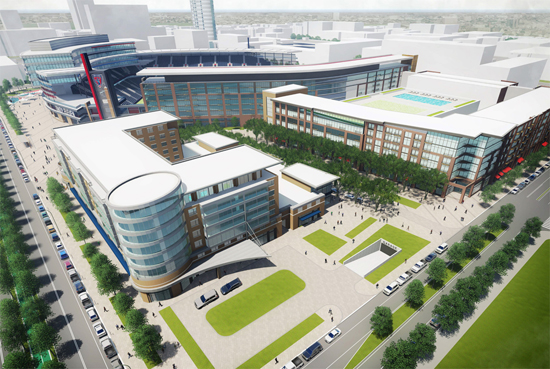Subscriber Benefit
As a subscriber you can listen to articles at work, in the car, or while you work out. Subscribe NowA proposal to build a permanent soccer stadium for the Indy Eleven had a big win on Thursday morning—but one that comes with a huge caveat.
The Senate Appropriations Committee added authorization to fund a soccer stadium to a bill that would provide additional funding to the Capital Improvement Board in Indianapolis, in part to upgrade Bankers Life Fieldhouse. But the revised bill makes money for a new Indy Eleven stadium available only if the team becomes a Major League Soccer franchise and kicks in at least 20 percent of the stadium construction costs.
The bill—which the committee approved and sent to the full Senate for consideration—would extend the life of multiple tourism- and entertainment-related taxes that help fund the CIB and expand the footprint of what’s known as the Professional Sports Development Area to capture even more tax revenue for the quasi-government agency.
Authored by Senate Appropriations Chairman Ryan Mishler, the bill would require a 25-year agreement between the CIB and the Indiana Pacers, meant to keep the team in Indianapolis for the foreseeable future.
On Thursday, the committee added language that would allow the creation of a new PSDA and capture of up to $8 million in tax dollars that would be used to construct the proposed $150 million stadium for the Indy Eleven. The location of the PSDA and the stadium are not specified in the legislation and would require multiple state approvals before it would be finalized.
And the state funding only becomes available if the team becomes part of the MLS and signs a 25-year deal with the CIB. The legislation gives the team just two years to join MLS.
Mishler said he did not confer with Indy Eleven on whether the two-year time frame was realistic, because the stadium would not necessarily have to be for Indy Eleven. The language only specifies that funding would be for a Major League Soccer team.
“It’s not an Indy Eleven bill. It’s a soccer stadium bill,” Mishler said. “Proponents of soccer wanted a soccer stadium, so we devised a plan very similar to that of the other stadiums.”
It’s a significant win for the Indy Eleven after several years of failed attempts to get state lawmaker support and failing to get a hearing on a separate bill filed for the stadium project, but the committee vote is only one hurdle.
As proposed by Indy Eleven owner Ersal Ozdemir, the soccer stadium would be part of a $550 million, mixed-use project called Eleven Park. The residential and commercial parts of the project would be privately funded, but Ozdemir proposed that the soccer stadium would be funded with tax revenue generated within the larger Eleven Park.
A bill introduced by Sen. Jack Sandlin, R-Indianapolis, would have created a new professional sports development area (like the one currently used to fund the CIB and its holdings) to collect up to $11 million in annual sales, income and other taxes at Eleven Park. The CIB would use that revenue to make bond payments on the soccer stadium.
Mishler did not give that bill a hearing. Instead, he folded some of those concepts into his CIB-funding legislation—but with the additional requirements about the MLS and some private funding for the soccer arena.
Eleven Park officials issued a statement Thursday, applauding members of the Appropriations Committee for their vote but also calling it "only the latest step in a long legislative process."
"We will continue to work directly with legislators and all stakeholders so that we can fully capture this once-in-a-generation opportunity to secure the future of soccer in Indiana."
Mishler voted against the amendment that added the soccer stadium language, but he voted to send the bill to the Senate.
“I still have some reservations,” Mishler said.
Please enable JavaScript to view this content.

